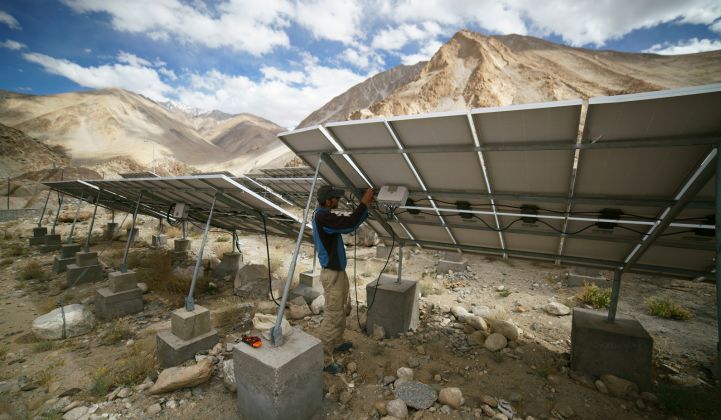France's Total agreed to buy a half-stake in a 2.1-gigawatt portfolio of operating PV plants in India owned by a unit of the Adani group, underscoring the rush of investment from oil and gas companies into the global renewable energy market.
Total will pay $510 million for a 50 percent stake in a new joint venture with Adani Green, one of India's leading solar developers, adding roughly 1 gigawatt to its global solar portfolio. Total is already active in India's solar market through a previous joint venture with French compatriot EDF; that JV owns about 200 megawatts today in India and recently signed off-take deals for another 700 megawatts of future capacity, according to Wood Mackenzie.
Separately, fellow oil major Shell on Friday signed off on a 120-megawatt PV plant in Queensland, Australia, which will be used to power a liquefied natural gas facility. The new plant will be located entirely within the footprint of the gas facility.
Total's much larger announcement will send it up the rankings of oil and gas majors by renewables capacity. Total currently has about 3 gigawatts of renewables capacity installed globally and is targeting a stake in up to 25 gigawatts by 2025.
“Total has been extremely active in the power and renewables M&A market as it seeks to diversify its activities and grow its exposure to the zero-carbon power sector," said Tom Heggarty, principal analyst with Wood Mackenzie’s Energy Transition Practice.
“The Adani investment is the sixth it and its subsidiary companies have made in renewable power businesses so far, beginning with the acquisition of a majority stake in SunPower in 2011," Heggarty said. "Since then, it has acquired operational and development solar PV and wind assets across a wide range of countries from France, to Australia, Brazil, and Egypt.”
The renewables industry has seen a flurry of recent acquisitions and venture activity from the oil majors, but project deals are rarer and have often been dominated by offshore wind.
Adani Green's portfolio comprises projects spread across 11 Indian states, and all of the projects have 25-year fixed-rate power-purchase agreements in place with local power distribution companies, known as discoms.
While Total's deal with Adani is currently limited to the 2.1-gigawatt portfolio, the developer has another 3.5 gigawatts underway in India.
India remains one of the world's most promising markets for solar energy, despite lagging behind its own ambitions. Back in 2015, India set a bold target of 100 gigawatts of installed solar capacity by 2022; as of October 2019, its total stood at 31.7 gigawatts, according to government figures.
Complex bidding procedures, trade tariffs, grid issues and local content rules have all slowed progress in India's solar market. Market sentiment was also undermined when discoms moved to reopen some contracts to take advantage of falling PPA prices.
Still, “India continues to offer gigawatt-size tenders with huge individual project sizes and a market that continues to grow," noted WoodMac analyst Rishab Shrestha. India auctioned around 11 gigawatts of future solar capacity last year, Shrestha said.
Total's busy year
Total has had a busy start to the year from an energy transition perspective. It recently won an 800-megawatt solar tender in Qatar in partnership with Marubeni, achieving a record-low PPA price in the process.
Total also revealed a contract to install and operate 20,000 EV chargers in the Netherlands, while its energy storage subsidiary Saft is exploring a European gigafactory partnership with automaker Opel.
The past few years have seen a number of oil and gas giants begin taking the renewables market very seriously.
Norway's Equinor is in the process of developing a number of major offshore wind projects that may leave it with 4 to 6 gigawatts of renewable capacity by 2026. Shell is building offshore wind farms in the U.S. and Europe, and it also holds stakes in solar companies in Australia and India.
Meanwhile, a recent portfolio acquisition by Portugal’s Galp Energia could leave it with nearly 3 gigawatts of solar in operation by 2023. And BP is on track to build 10 gigawatts of solar by 2023 through its Lightsource BP joint venture.
BP's new CEO Bernard Looney is set to present the company's new "low carbon ambition" next week. In response to protests this week that shut down the company's London headquarters, BP said that Looney “hopes that what he has to say then will give people a sense that we get it and are very serious about working to address the problem.”




